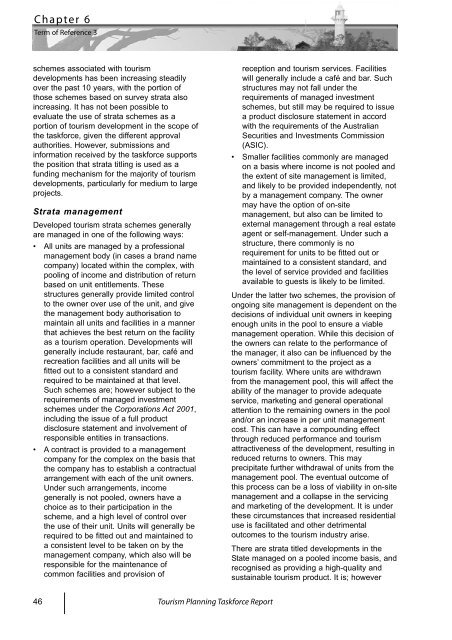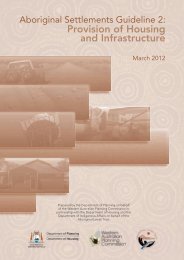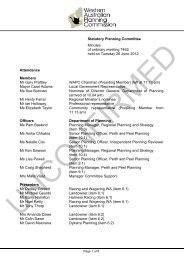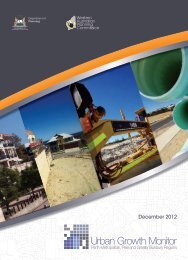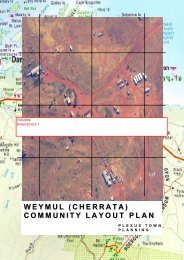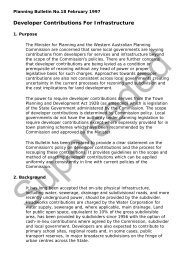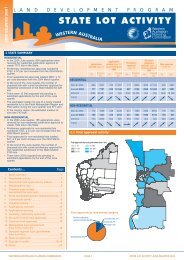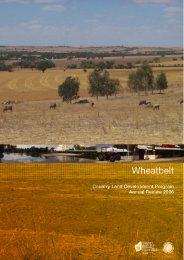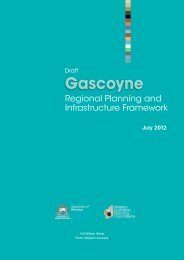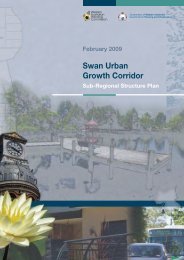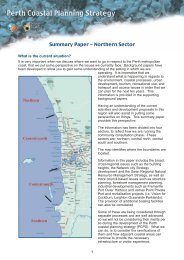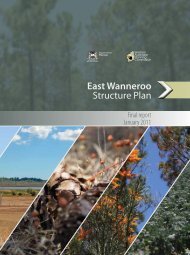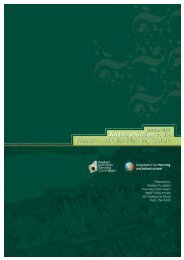Tourism Planning Taskforce Report - Western Australian Planning ...
Tourism Planning Taskforce Report - Western Australian Planning ...
Tourism Planning Taskforce Report - Western Australian Planning ...
- No tags were found...
You also want an ePaper? Increase the reach of your titles
YUMPU automatically turns print PDFs into web optimized ePapers that Google loves.
Chapter 6Term of Reference 3schemes associated with tourismdevelopments has been increasing steadilyover the past 10 years, with the portion ofthose schemes based on survey strata alsoincreasing. It has not been possible toevaluate the use of strata schemes as aportion of tourism development in the scope ofthe taskforce, given the different approvalauthorities. However, submissions andinformation received by the taskforce supportsthe position that strata titling is used as afunding mechanism for the majority of tourismdevelopments, particularly for medium to largeprojects.Strata managementDeveloped tourism strata schemes generallyare managed in one of the following ways:• All units are managed by a professionalmanagement body (in cases a brand namecompany) located within the complex, withpooling of income and distribution of returnbased on unit entitlements. Thesestructures generally provide limited controlto the owner over use of the unit, and givethe management body authorisation tomaintain all units and facilities in a mannerthat achieves the best return on the facilityas a tourism operation. Developments willgenerally include restaurant, bar, café andrecreation facilities and all units will befitted out to a consistent standard andrequired to be maintained at that level.Such schemes are; however subject to therequirements of managed investmentschemes under the Corporations Act 2001,including the issue of a full productdisclosure statement and involvement ofresponsible entities in transactions.• A contract is provided to a managementcompany for the complex on the basis thatthe company has to establish a contractualarrangement with each of the unit owners.Under such arrangements, incomegenerally is not pooled, owners have achoice as to their participation in thescheme, and a high level of control overthe use of their unit. Units will generally berequired to be fitted out and maintained toa consistent level to be taken on by themanagement company, which also will beresponsible for the maintenance ofcommon facilities and provision ofreception and tourism services. Facilitieswill generally include a café and bar. Suchstructures may not fall under therequirements of managed investmentschemes, but still may be required to issuea product disclosure statement in accordwith the requirements of the <strong>Australian</strong>Securities and Investments Commission(ASIC).• Smaller facilities commonly are managedon a basis where income is not pooled andthe extent of site management is limited,and likely to be provided independently, notby a management company. The ownermay have the option of on-sitemanagement, but also can be limited toexternal management through a real estateagent or self-management. Under such astructure, there commonly is norequirement for units to be fitted out ormaintained to a consistent standard, andthe level of service provided and facilitiesavailable to guests is likely to be limited.Under the latter two schemes, the provision ofongoing site management is dependent on thedecisions of individual unit owners in keepingenough units in the pool to ensure a viablemanagement operation. While this decision ofthe owners can relate to the performance ofthe manager, it also can be influenced by theowners’ commitment to the project as atourism facility. Where units are withdrawnfrom the management pool, this will affect theability of the manager to provide adequateservice, marketing and general operationalattention to the remaining owners in the pooland/or an increase in per unit managementcost. This can have a compounding effectthrough reduced performance and tourismattractiveness of the development, resulting inreduced returns to owners. This mayprecipitate further withdrawal of units from themanagement pool. The eventual outcome ofthis process can be a loss of viability in on-sitemanagement and a collapse in the servicingand marketing of the development. It is underthese circumstances that increased residentialuse is facilitated and other detrimentaloutcomes to the tourism industry arise.There are strata titled developments in theState managed on a pooled income basis, andrecognised as providing a high-quality andsustainable tourism product. It is; however46 <strong>Tourism</strong> <strong>Planning</strong> <strong>Taskforce</strong> <strong>Report</strong>


